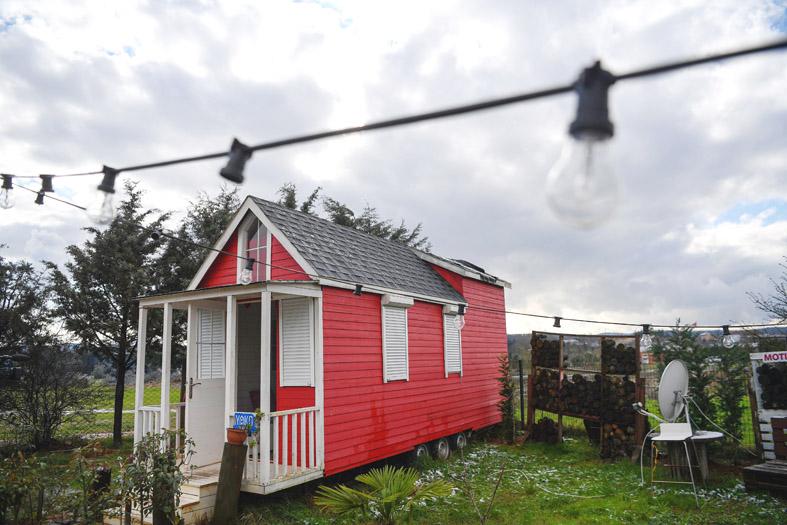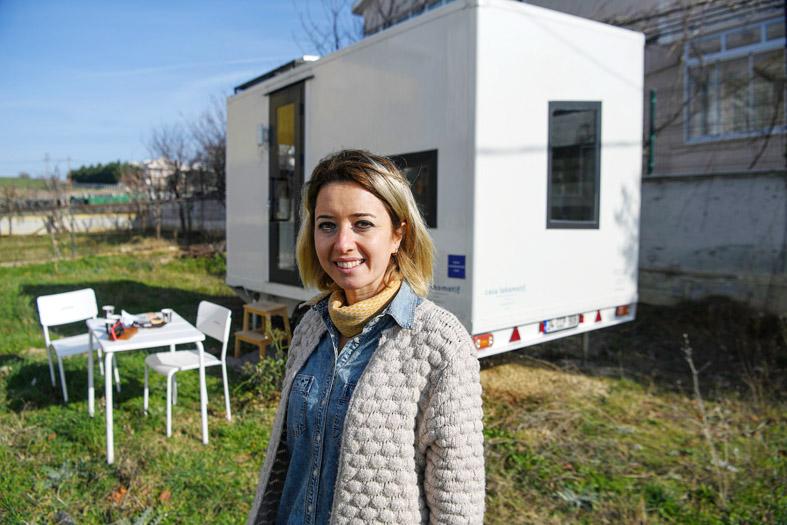Gizem Baburhan stepped into a tiny house on wheels she rented in the Aegean vineyards and saw the future of Turkey’s COVID-19-ravaged tourism industry.
“This minimalist life offered us priceless peace,” Baburhan said. “I hope in the future, we will own a tiny house and tour the world with a home on our backs.”
The tiny house movement — a fad that gained momentum in the US in the wake of the 2008 global financial crisis — appears to have caught on in Turkey during the COVID-19 pandemic.

Photo: AFP
The unimposing wood and composite metal structures resemble spruced-up sheds on wheels or sawn-off trailer homes.
Yet the Turkish firms that make them say they have barely been able to keep up with demand in the past year.
YAKO Groups chief executive Galip Olmez said that he received only “sporadic orders” after introducing the idea to Turkey in 2017.

Photo: AFP
“If we compare 2020 with the previous year, the orders have increased 20-fold,” Olmez said without disclosing precise numbers.
Architect Pelin Dustegor said that most of her Casa Lokomotif tiny house company’s clients were “from the tourism industry looking for camping concepts.”
“We had just under 250 orders in all of 2019 and this shot up to 4,500 a month in 2020,” Dustegor said. “There has been tremendous interest.”
Turkey is perhaps best known to global tourists as the place of golden beaches and all-inclusive luxury hotels, but the economic shock of the pandemic and suspicions that people could shy away from crowds for years to come have some Turkish tourism firms revising their plans.
Dustegor said that the tiny houses’ popularity with tourism firms is rooted in their low investment cost and the potential to turn a profit within three-and-a-half years.
The houses can also be parked on land without a building permit because they have the status of a vehicle in Turkey.
People between their late 30s and early 40s also tend to buy them as an investment and then rent them out, Dustegor said.
Caglar Gokgun rents out the tiny house he bought and parked in the middle of a vineyard on the Aegean Sea.
“People will want to stay in nature in small groups rather than at a 500-person hotel,” Gokgun said. “No one will want to wait in line for an open buffet.”
Baburhan said that the New Year holiday she spent with her husband at Gokgun’s vineyard home was like being in Alice’s Adventures in Wonderland.
“We didn’t know what to expect at first, but we found ourselves in a tiny, fully fledged house in the heart of a wonderful vineyard. We quickly got used to the house and felt like we have been living there for years,” she said.
Olmez said that his firm produces homes ranging from 15m2 40m2 — about the size of a small studio or a hotel room.
Their prices range from US$17,000 to US$30,000. It is hard to buy a small house in Istanbul for less than US$70,000.
Clients who want to put down a tiny house on land they already own are responsible for hooking up the water and electricity, while the firm builds the home, and takes care of the furnishings and design.
“We see tiny houses as the future of tourism in Turkey,” Olmez said in his tiny house showroom on the outskirts of Istanbul.
Olmez said that a year of lockdowns has prompted many to reassess the benefit of spending time in concrete apartment blocks.
“Humanity has begun to return to its roots,” said Olmez, as two young women checked out a cabin on wheels in his showroom. “People should not be scared of minimalism. It does not shrink life, but liberates it.”

VAGUE: The criteria of the amnesty remain unclear, but it would cover political violence from 1999 to today, and those convicted of murder or drug trafficking would not qualify Venezuelan Acting President Delcy Rodriguez on Friday announced an amnesty bill that could lead to the release of hundreds of prisoners, including opposition leaders, journalists and human rights activists detained for political reasons. The measure had long been sought by the US-backed opposition. It is the latest concession Rodriguez has made since taking the reins of the country on Jan. 3 after the brazen seizure of then-Venezuelan president Nicolas Maduro. Rodriguez told a gathering of justices, magistrates, ministers, military brass and other government leaders that the ruling party-controlled Venezuelan National Assembly would take up the bill with urgency. Rodriguez also announced the shutdown

Civil society leaders and members of a left-wing coalition yesterday filed impeachment complaints against Philippine Vice President Sara Duterte, restarting a process sidelined by the Supreme Court last year. Both cases accuse Duterte of misusing public funds during her term as education secretary, while one revives allegations that she threatened to assassinate former ally Philippine President Ferdinand Marcos Jr. The filings come on the same day that a committee in the House of Representatives was to begin hearings into impeachment complaints against Marcos, accused of corruption tied to a spiraling scandal over bogus flood control projects. Under the constitution, an impeachment by the

Exiled Tibetans began a unique global election yesterday for a government representing a homeland many have never seen, as part of a democratic exercise voters say carries great weight. From red-robed Buddhist monks in the snowy Himalayas, to political exiles in megacities across South Asia, to refugees in Australia, Europe and North America, voting takes place in 27 countries — but not China. “Elections ... show that the struggle for Tibet’s freedom and independence continues from generation to generation,” said candidate Gyaltsen Chokye, 33, who is based in the Indian hill-town of Dharamsala, headquarters of the government-in-exile, the Central Tibetan Administration (CTA). It

A Virginia man having an affair with the family’s Brazilian au pair on Monday was found guilty of murdering his wife and another man that prosecutors say was lured to the house as a fall guy. Brendan Banfield, a former Internal Revenue Service law enforcement officer, told police he came across Joseph Ryan attacking his wife, Christine Banfield, with a knife on the morning of Feb. 24, 2023. He shot Ryan and then Juliana Magalhaes, the au pair, shot him, too, but officials argued in court that the story was too good to be true, telling jurors that Brendan Banfield set